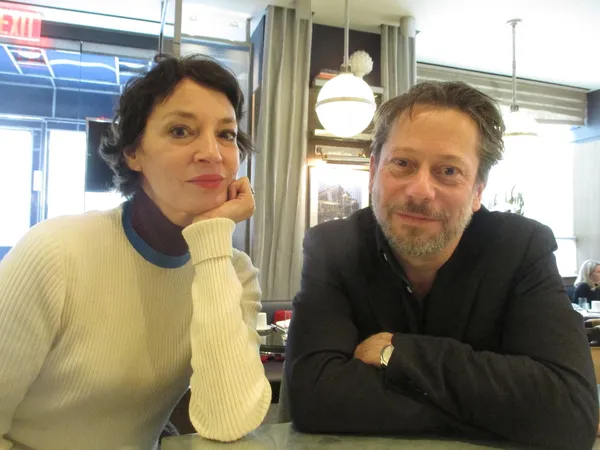Mathieu Amalric e-mailed me on March 5, 2018 with the news that André S Labarthe, producer and director of Cinéastes De Notre Temps, had died that morning in Paris. Mathieu and I made plans to meet in New York the morning after his presentation of Barbara with Jeanne Balibar. Mathieu Amalric, l'art et la matière was the last profile Labarthe did for the documentary series.
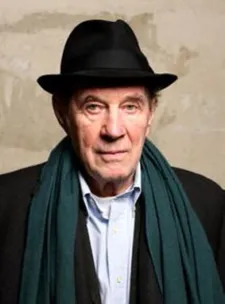 |
| André S Labarthe played Paul to Anna Karina's Nana in Jean-Luc Godard's Vivre Sa Vie (My Life To Live) |
During our conversation on Barbara, which was the opening night selection for uniFrance and the Film Society of Lincoln Center's Rendez-Vous with French Cinema, Mathieu and Jeanne shared some of their thoughts and memories with me about "the presence of the witness" and Labarthe's unforgettable television programs on filmmakers.
Anne-Katrin Titze: You, Mathieu, were the first person who informed me that André Labarthe died.
Mathieu Amalric: Yes. I had just learned it. It was that morning.
AKT: He had an enormous impact on all different kinds of people involved with cinema. We all learned about filmmakers from him and made discoveries seeing his portraits on TV.
MA: It has to do with the spirit thing also, no? [We had just talked about that subject in the context of Mathieu's film Barbara]. He was searching people. Why do I have this taste for filming people working? It comes from Labarthe! The way he filmed the bumps and the holes during the set.
I will never forget the silence of Nanni Moretti, for instance, in one of the works Labarthe did. You just see a two-minute silence. He's doing La Palombella Rossa. No questions, two minutes silence and you understand everything.
AKT: About Nanni Moretti.
MA: Yes. Nothing and that's all. Then Nanni plays tennis. It's not supposed to be important stuff. And Labarthe just grabs something so precious that you shouldn't touch. You can't put the word creation on it. It's jouissance.
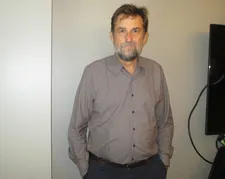 |
| Mathieu Amalric on André S Labarthe's Nanni Moretti profile: "No questions, two minutes silence and you understand everything." Photo: Anne-Katrin Titze |
Jeanne Balibar: Not only that. It's very funny because there's always this idea that the presence of the actor is something very important. They say: you can't be an actor if you don't have presence. They say: such and such an actor or actress has such a strong presence on the screen or on the stage. It's the key word for actors and actresses.
I always thought, actually the most important thing is the presence of the director. If the director doesn't have an immense physical presence there's not going to be a movie. And with Labarthe we had the impression it's not only the presence of the actors or the directors that matters but also the presence of the witness.
AKT: That describes it really well.
JB: He was this witness. With this massive density of presence, witnessing everything. I don't know how many years of cinema. Witnessing a revolution, the Nouvelle Vague and its aftermath. For me, I'd say Labarthe is the presence of the witness.
AKT: That's beautiful. Besides the Nanni Moretti, are there specific moments of Labarthe's programs that stayed in your mind?
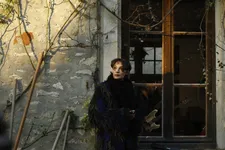 |
| Jeanne Balibar: "For me, I'd say Labarthe is the presence of the witness." |
MA: Of course the Cassavetes. Because the Cassavetes is in two parts. And it's the gap between the two that is … You see this man with so much energy in his garage showing to Labarthe "I'm doing this! I'm doing that!" And then there is a cut. Then you see the fatigue.
And it's on the face of Gena Rowlands that is protecting him. And you see the cost of being independent. The cost of going against. And you see it in a cut. All of them - you see it in the Shirley Clarke one.
JB: Which one is that? Who is Shirley Clarke again?
MA: She's an American filmmaker, documentaries but experimental. There's also the one with John Ford in his bed. That's absolutely hallucinative when he films John Ford in his bed. He also filmed dance a lot after that. The Cronenberg, that one is very astonishing.
AKT: I don't think I've seen that. When did he do Cronenberg?
MA: That was I would say beginning of the Nineties.
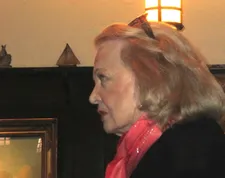 |
| Mathieu Amalric on Gena Rowlands in André S Labarthe's John Cassavetes: "You see the cost of being independent. The cost of going against." Photo: Anne-Katrin Titze |
AKT: So a while after David Cronenberg was doing things like Videodrome?
MA: Yeah and there was a lot of television in that one.
JB: And his last film was going to be on Mathieu.
MA: Yes, he was present on the shooting of Barbara. His last film's going to be on me, Cinéastes de notre temps. You know, I had him on the phone two days before. And he shot these things. Jeanne didn't even see the film yet. I saw the film finished.
AKT: So you are the last one. I didn't know he was on your set for Barbara.
MA: He was in Tournée (On Tour, 2010), you know. In Tournée I asked him to be this witness. And he does this producer. Just a little scene at the beginning of the film.








